-
Recent Posts
Archives
- October 2022
- August 2022
- May 2022
- March 2022
- January 2022
- December 2021
- September 2021
- July 2021
- June 2021
- May 2021
- April 2021
- February 2021
- January 2021
- November 2020
- October 2020
- September 2020
- June 2020
- April 2020
- March 2020
- February 2020
- January 2020
- December 2019
- November 2019
- October 2019
- September 2019
- June 2019
- March 2019
- February 2019
- January 2019
- December 2018
- November 2018
- October 2018
- August 2018
- July 2018
- June 2018
- May 2018
- April 2018
- March 2018
- February 2018
- January 2018
- December 2017
- November 2017
- October 2017
- September 2017
- August 2017
- July 2017
- June 2017
- May 2017
- April 2017
- March 2017
- February 2017
- January 2017
- December 2016
- November 2016
- August 2016
- July 2016
- June 2016
- May 2016
- April 2016
- March 2016
- February 2016
- January 2016
- December 2015
- November 2015
- October 2015
- September 2015
- August 2015
- July 2015
- June 2015
- May 2015
- April 2015
- March 2015
- December 2014
- June 2014
- May 2014
- April 2014
- November 2013
- September 2013
- August 2013
- July 2013
- June 2013
- May 2013
- March 2013
- January 2013
- November 2012
- October 2012
- July 2012
- December 2011
- November 2011
- October 2011
- September 2011
- August 2011
- July 2011
- June 2011
- May 2011
- April 2011
- March 2011
- February 2011
- January 2011
- December 2010
- November 2010
Categories
Surgery Success: Rocco
Rocco went to the back yard and came back fully impaled on a PVC pipe! In horror, his family brought him to NorthStar VETS where Dr. Joanna Lloyd of the NorthStar VETS Emergency service examined Rocco and worked with Dr. Katherine Kerrigan of the Radiology service to get a CT scan of his body. Incredibly, no major organs or vessels were damaged! The pipe entered Rocco’s chest missing his heart, lungs, and esophagus. It penetrated his diaphragm, but missed his liver, kidneys and intestines as it exited his lower back. Dr. Kelly Kraus of the Surgery team performed the hours-long operation, which confirmed the lack of damage, removed the pipe, cleaned the area, and closed the holes. Having recovered, Rocco’s medical care was transferred to Dr. Kristie Decker at Pet’s Best Friend in Levittown, PA. He walked out of the hospital with his tail wagging, completely unaware of the miracle that happened.
Learn more about the Emergency and Surgery services at NorthStar VETS.
https://youtu.be/J1RAY0MqJ_o
Joanna Lloyd, VMD
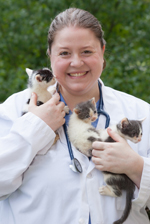 Dr. Lloyd grew up in Philadelphia before going to Williams College in Massachusetts where she majored in Chemistry with a specialization in Biochemistry and Molecular Biology. After college and a brief stint as an ER veterinary technician, Dr. Lloyd earned her veterinary degree from the University of Pennsylvania. She joined NorthStar VETS in April 2018.
Dr. Lloyd grew up in Philadelphia before going to Williams College in Massachusetts where she majored in Chemistry with a specialization in Biochemistry and Molecular Biology. After college and a brief stint as an ER veterinary technician, Dr. Lloyd earned her veterinary degree from the University of Pennsylvania. She joined NorthStar VETS in April 2018.
Dr. Lloyd’s clinical interests include veterinary neonatal and pediatric care, trauma, and urinary obstructions. In her spare time, Dr. Lloyd raises orphaned kittens and makes jewelry.
Kelly Kraus, VMD, DACVS
 Dr. Kraus is originally from Connecticut. She obtained a Bachelor of Science degree from Loyola University in Baltimore, Maryland in 2003 before moving to Philadelphia, where she did molecular genetics research for two years at the University of Pennsylvania. Dr. Kraus then completed veterinary school at the University of Pennsylvania in 2009. After graduating, she completed a rotating internship at Oradell Animal Hospital in Paramus, NJ. She then moved to Texas to complete a one-year internship in surgery at Gulf Coast Veterinary Specialists. She was fortunate to then move back to New Jersey for a three-year residency in surgery at Red Bank Veterinary Hospital, which she completed in 2014.
Dr. Kraus is originally from Connecticut. She obtained a Bachelor of Science degree from Loyola University in Baltimore, Maryland in 2003 before moving to Philadelphia, where she did molecular genetics research for two years at the University of Pennsylvania. Dr. Kraus then completed veterinary school at the University of Pennsylvania in 2009. After graduating, she completed a rotating internship at Oradell Animal Hospital in Paramus, NJ. She then moved to Texas to complete a one-year internship in surgery at Gulf Coast Veterinary Specialists. She was fortunate to then move back to New Jersey for a three-year residency in surgery at Red Bank Veterinary Hospital, which she completed in 2014.
She is excited to be part of the surgery team at NorthStar VETS. Her special surgical interests include, but are not limited to, wound management and reconstructive surgery, surgical oncology, cardiothoracic surgery, and hepatobiliary surgery. Dr. Kraus also enjoys management of orthopedic conditions. She is trained in the tibial plateau leveling osteotomy (TPLO) for cranial cruciate ligament disease. Outside of work, Dr. Kraus enjoys spending time with her family, cooking, traveling, and helping her local SPCA.
Posted in Pets, Veterinary Medicine
Tagged Joanna Lloyd, Kelly Kraus, NorthStar VETS
Leave a comment
Inspiration in the 2021 Purpose in Action Book
At this important time in history, NorthStar VETS released its 2021 Purpose in Action book designed to inspire you to do great things. With 22 authors, 24 pages, and 39 unique personal stories, get wisdom and advice from our doctors on finding and fulfilling your purpose.
Download your copy of the 2021 Purpose in Action book at NorthStarVETS.com.
Posted in Pets, Pets, Uncategorized, Veterinary Medicine
Tagged NorthStar VETS, Purpose in Action, veterinary inspiration
Leave a comment
What to Expect During your NorthStar VETS Visit
As we all know too well, the pandemic has changed just about every aspect of daily life, and visiting the veterinary hospital is no exception. At NorthStar VETS, every member of our team has worked harder than ever for our patients, clients, referring veterinary practices, and each other as demand for veterinary services has increased tremendously. With that, we ask for your patience and understanding that wait times are longer than usual.
Recently, a client in Robbinsville gave us this feedback. “Our local vet was no longer offering service at nights or on weekends. They had staffing issues, operational issues, and scheduling issues all brought about by the pandemic. Chili’s issues seemingly compounded at the same time. That left us coming to NorthStar VETS, and I’m sure we were not alone. We could see your attentive staff doing their best to provide much needed services for your patients and their families. I’m sure at times the volume of patients was off the charts. It wasn’t lost on us that all of you have families and pets that you care about. We can’t begin to express how thankful we were that all of you came to work at great personal expense. You were our heroes! That alone doesn’t begin to express our deepest appreciation for your collective commitment to the work you do every day. Thank you!”
At our location in Brick, a lovely client visited us with her pet. Knowing how busy things were and that there would be long wait times, she came prepared. To keep herself and her pet comfortable, she had a blanket, snacks, phone charger, and entertainment.
Why are emergency visits taking so long?
Pet hospitals nationwide are overwhelmed with sick and injured pets, creating longer emergency wait times. All NorthStar VETS locations have seen patient surges due to family veterinarians being closed or not accepting new clients. As in human medicine, our facilities triage patients according to an assigned degree of urgency based on wound, illness, or trauma. The higher degree of urgency, the quicker a patient is admitted. While this can be frustrating, it helps our ER staff assist those requiring immediate treatment faster and even saves lives.
Long wait times are a result of:
- A larger volume of cases overall.
- Curbside check-in procedures taking more time, but keeping our clients, staff, and patients safe.
- Critical patients taking priority and requiring immediate refocused attention of staff.
- An influx of phone calls increasing on hold times.
- Diagnostic work-ups and tests (i.e. blood work, X-rays, and ultrasounds) taking longer to process due to increased demand from in-hospital patients.
- Backlogs in our Pharmacy department as a result of refill requests from clients at home.
What hasn’t changed is our absolute commitment to you and your pet. We are doing our best to serve you 24/7, but need your help! Please bring patience, kindness and good energy to your conversations with our Customer Service Representatives, technicians, and doctors. Allow ample wait times for physical exams, patient work-ups, prescriptions, discharge instructions and follow-up paperwork.
For the latest information on how to efficiently navigate our curbside protocols, read the announcement at https://www.northstarvets.com/blog/update-to-our-covid-19-hospital-protocols/.
Posted in Pets, Veterinary Medicine
Tagged Coronavirus, COVID-19, Curbside, NorthStar VETS
2 Comments
Pet Food Recall
Midwestern Pet Foods, Inc., of Evansville, IN is issuing a voluntary recall of the below listed dog and cat food products due to tests indicating levels of Aflatoxin that exceed acceptable limits. Products were distributed nationally to online distributors and retail stores.
Aflatoxin is a toxin produced by the mold Aspergillus flavus, which can grow on corn and other grains used as ingredients in pet food. At high levels, aflatoxin can cause illness and death in pets.
There have been reports of illnesses and deaths in dogs associated with the below listed lots of Sportmix High Energy. No cat or human illnesses have been reported.
If your pet shows signs of aflatoxin poisoning including sluggishness, loss of appetite, vomiting jaundice (yellowish tint to the eyes, gums, or skin due to liver damage), and/or diarrhea, contact a veterinarian immediately. Provide a full diet history to your veterinarian. It may be helpful to take a picture of the pet food label, including the lot number.
Lot code information may be found on the back of bag and will appear in a three-line code, with the top line in format “EXP 03/03/22/05/L#/B###/HH:MM” as follows (see below in pictures section).
Retailers and distributors should immediately pull recalled lots from their inventory and shelves. Do not sell or donate the recalled products. Retailers are encouraged to contact consumers who have purchased the recalled products, if you have the means to do so (frequent buyer cards, etc.).
Pet parents: do not feed the recalled products to your pets or any other animals. Destroy the products in a way that children, pets and wildlife cannot access them. Wash and sanitize pet food bowls, cups and storage containers.
Contact Midwestern Pet Foods Consumer Affairs at 800-474-4163, ext. 455 from 7AM to 4PM Central Time, Monday through Friday, or by email at info@midwesternpetfoods.com for additional information.
This is a voluntary recall conducted in cooperation with the U.S. Food and Drug Administration.
Recalled lot codes are as follows:
. 50# Sportmix Energy Plus Lots Exp 03/02/22/05/L2, 03/02/22/05/L3, 03/03/22/05/L2
. 44# Sportmix Energy Plus Lots 03/02/22/05/L3
. 50# Sportmix Premium High Energy Lots 03/03/22/05/L3
. 44# Sportmix Premium High Energy Lots 03/03/22/05/L3
. 31# Sportmix Original Cat Lots 03/03/22/05/L3
. 15# Sportmix Original Cat Lots 03/03/22/05/L2, 03/03/22/05/L3
NAVIGATE THE SEASON IN TIMES OF SADNESS
HAPPY HOLIDAYS? How to Navigate the Season in Times of Sadness
The holidays release many emotions when we are grieving. Memories of loved ones and/or cherished pets who have passed, weigh heavy on our hearts. The best coping mechanism for grief is to have a plan to help ourselves. In times of sadness, well-meaning family and friends don’t know what to say or how to act, so they may appear withdrawn, uncaring, silent, cold, awkward, or sometimes even bossy. Remember that their true hearts do love you, but they don’t exactly know how to show it.
Tips To Comfort Yourself During The Holidays
- Understand that the holidays will be different and challenging. The pandemic and the loss of your pet will be a tough struggle. It’s important to continue to care for yourself and allow the grieving process to happen naturally.
- Remember tears are healthy, as they connect your heart and brain. They seem to flow out of nowhere. They are a normal reaction and allow yourself to heal.
- Decide which holiday traditions to keep or change. Many families will not be getting together this season. FaceTime or ZOOM has become the new “family dinner hour.” If you are videoing with family, ask them to share a favorite memory they had with your pet. You can put their memories on paper, keep in a memory box/ photo album, create an ornament. Hearing their memories will bring peace knowing your pet touched them as well.
- Donate pet toys/bedding to an animal shelter in your pet’s honor. Be sure to ask first if they are taking such donations during this time of the pandemic. Unopened food is always accepted and appreciated. Consider making a monetary donation in your pet’s honor.
- If you’re not feeling up to hosting company this year – don’t. If attending a gathering (sometimes it’s good to be with loved ones), have an exit plan. Drive yourself or signal to you partner when you want to leave if the grief becomes too strong.
- Give yourself “alone time.” Journal feelings/memories while listening to soothing music to help you express your emotions. Writing also helps your brain and heart connect again. When you go back to read your words, you’ll see that you did all you could for your pet.
Most importantly – reach out for help. The season can be a trying time, even if with well-laid plans and strategies. Talk with a friend who can offer a listening ear or a strong shoulder to lean on. Also know that you are not alone. As NorthStar VETS certified bereavement counselor, I can ALWAYS be reached via e-mail at arooney@northstarvets.com. Through my own personal experiences and years of specialized grief training, I consider it a great privilege to be able to help others who are suffering. Please contact me so that I can provide the necessary tools to aid you in your grief recovery.
I wish you a comforting and healing holiday season!
 Ann Rooney, Certified Bereavement Specialist and Animal Chaplain
Ann Rooney, Certified Bereavement Specialist and Animal Chaplain
For over 16 years, Ann Rooney has worked in the veterinary field comforting pet parents in times of crisis. Certified by the Association for Pet Loss and Bereavement in 2016, Ann has committed her career to supporting the emotional needs of clients who have lost their trusted animal companion. By working with veterinarians, connecting with various pet cemeteries, and even experiencing her own pet loss, Ann is a terrific resource for helping clients navigate the difficult part of mourning a pet.
Posted in Pets, Pets, Uncategorized
Tagged Ann Rooney, bereavement, grieving, NorthStar VETS, Pet Loss
Leave a comment
Cool Case: Bruno
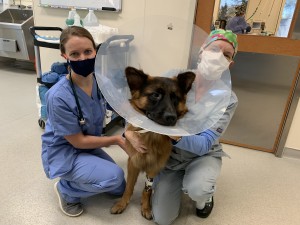 Bruno is a one-year-old, male, intact German Shepherd. He was seen by his primary care veterinarian for hind limb lameness. On physical examination, the veterinarian heard an irregular heartbeat and referred Bruno to NorthStar VETS. He was seen in September and diagnosed with lone atrial fibrillation. Atrial fibrillation typically causes an irregular and rapid heart rhythm due to chaotic electrical signals in the upper chambers of the heart (the atria). In small animal patients, atrial fibrillation usually develops due to significant underlying heart disease. Lone atrial fibrillation, on the other hand, refers to atrial fibrillation with a relatively normal heart rate and no underlying heart disease. Lone atrial fibrillation is most commonly seen in large and giant breed dogs (as well as horses) because a relatively large heart size is required to initiate and sustain this type of heart rhythm.
Bruno is a one-year-old, male, intact German Shepherd. He was seen by his primary care veterinarian for hind limb lameness. On physical examination, the veterinarian heard an irregular heartbeat and referred Bruno to NorthStar VETS. He was seen in September and diagnosed with lone atrial fibrillation. Atrial fibrillation typically causes an irregular and rapid heart rhythm due to chaotic electrical signals in the upper chambers of the heart (the atria). In small animal patients, atrial fibrillation usually develops due to significant underlying heart disease. Lone atrial fibrillation, on the other hand, refers to atrial fibrillation with a relatively normal heart rate and no underlying heart disease. Lone atrial fibrillation is most commonly seen in large and giant breed dogs (as well as horses) because a relatively large heart size is required to initiate and sustain this type of heart rhythm.
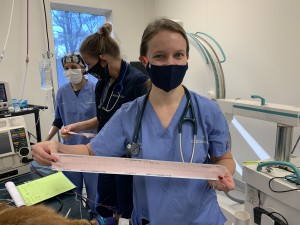 Bruno was not symptomatic for atrial fibrillation at the time of presentation. He was active, energetic, and seemed totally normal to his family. However, the long-term consequences of atrial fibrillation remain unknown. Atrial fibrillation, which causes loss of coordinated contraction between the upper (atria) and lower (ventricles) chambers of the heart, leads to sub-optimal cardiac performance and could negatively affect the heart’s structure and function over time.
Bruno was not symptomatic for atrial fibrillation at the time of presentation. He was active, energetic, and seemed totally normal to his family. However, the long-term consequences of atrial fibrillation remain unknown. Atrial fibrillation, which causes loss of coordinated contraction between the upper (atria) and lower (ventricles) chambers of the heart, leads to sub-optimal cardiac performance and could negatively affect the heart’s structure and function over time.
The team at NorthStar VETS opted for electrical cardioversion of atrial fibrillation. Delivery of an electrical current to the entire heart via patches placed on either side of the chest helps to break the irregular heart rhythm and allows the heart’s own pacemaker (the sinus node) to resume control of the heart rate and rhythm. Dr. Alexandra Crooks of the Cardiology team worked closely with Dr. Urshulaa Dholakia of the Anesthesia service to come up with an anesthetic protocol. Dr. Steven Berkowitz of the Critical Care team gathered all of the supplies and medications they might need in the event of a complication (mostly worsening arrhythmias immediately after the shock). In the end, a single shock of 50 joules was enough to successfully convert him from atrial fibrillation to sinus rhythm. Bruno recovered well from the procedure and went home later the same day.
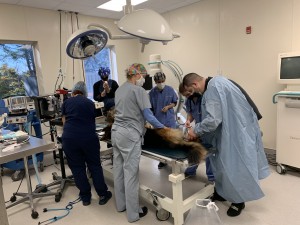 Bruno will continue to be monitored to make sure he stays in sinus rhythm for as long as possible. He may be at risk of going back into atrial fibrillation at some point in the future. He is on an anti-arrhythmic medication called amiodarone, which should delay and/or minimize that risk as much as possible. He will be back in two months to reassess his heart rhythm using echocardiogram (ECG).
Bruno will continue to be monitored to make sure he stays in sinus rhythm for as long as possible. He may be at risk of going back into atrial fibrillation at some point in the future. He is on an anti-arrhythmic medication called amiodarone, which should delay and/or minimize that risk as much as possible. He will be back in two months to reassess his heart rhythm using echocardiogram (ECG).
Learn more about the Cardiology service at NorthStar VETS.
Alexandra Crooks, VMD (Practice Limited to Cardiology)
 Dr. Alexandra Crooks was born and raised in Philadelphia, Pennsylvania. She completed her undergraduate studies at the University of Pennsylvania in 2012. She graduated from the University of Pennsylvania School of Veterinary Medicine in 2016. She stayed at the Matthew J. Ryan Veterinary Hospital of the University of Pennsylvania for a one-year rotating internship in small animal medicine and surgery and a three-year residency in cardiology, which she completed in July 2020. Although she enjoys all aspects of veterinary cardiology, she has a special interest in cardiovascular imaging and pathology, management of heart failure, and diagnosis and treatment of arrhythmias.
Dr. Alexandra Crooks was born and raised in Philadelphia, Pennsylvania. She completed her undergraduate studies at the University of Pennsylvania in 2012. She graduated from the University of Pennsylvania School of Veterinary Medicine in 2016. She stayed at the Matthew J. Ryan Veterinary Hospital of the University of Pennsylvania for a one-year rotating internship in small animal medicine and surgery and a three-year residency in cardiology, which she completed in July 2020. Although she enjoys all aspects of veterinary cardiology, she has a special interest in cardiovascular imaging and pathology, management of heart failure, and diagnosis and treatment of arrhythmias.
Urshulaa Dholakia, DVM, MPH, DACLAM, DACVAA Dr. Dholakia attended St. George’s University School of Veterinary Medicine, and following graduation completed a rotating small animal internship. She went on to a residency program in Laboratory Animal Medicine at Columbia University in New York City in 2008, and continued working as a laboratory animal vet for several years. She went on to pursue a further specialization in large and small animal anesthesiology first through an internship at the University of Illinois College of Veterinary Medicine, and subsequent residency at the University of Tennessee College of Veterinary Medicine, in Knoxville, TN.
Dr. Dholakia attended St. George’s University School of Veterinary Medicine, and following graduation completed a rotating small animal internship. She went on to a residency program in Laboratory Animal Medicine at Columbia University in New York City in 2008, and continued working as a laboratory animal vet for several years. She went on to pursue a further specialization in large and small animal anesthesiology first through an internship at the University of Illinois College of Veterinary Medicine, and subsequent residency at the University of Tennessee College of Veterinary Medicine, in Knoxville, TN.
Steven Berkowitz, DVM, DACVECC
Dr. Steven Berkowitz attended St. Georges University and did his clinical year at the University of Illinois. Berkowitz joined NorthStar VETS after serving as the Chief of Emergency and Critical Care at another specialty hospital. Prior to that, he completed a three-year residency in Emergency and Critical Care medicine at the Oradell Animal Hospital in Paramus, NJ. His residency was completed at one of only a few recognized veterinary trauma centers in the United States. Prior to his residency, he was a staff Emergency Veterinarian at Animal Specialty Center in Yonkers, NY as well as serving as an emergency doctor at Animal Emergency and Referral Associates in Fairfield, NJ for 3 years. Dr. Berkowitz can be seen on seasons 5 and 6 of “Animal Precinct” on Animal Planet, which was filmed during his internship at The Bergh Memorial Animal Hospital of the ASPCA in New York City.
Dr. Berkowitz has special interest in the management of metabolic and endocrine derangements, trauma, as well as management of the septic patient.
Posted in Pets, Veterinary Medicine
Tagged Alexandra Crooks VMD, atrial fibrillation, Bruno, cardiology, cardioversion, NorthStar VETS
1 Comment
Reinstating Curbside Protocols
Dear Pet Parents,
Due to the increase in COVID-19 cases in the area, NorthStar VETS is reinstating its curbside procedures on Monday, November 2 to keep patients, clients and staff safe. These are our new procedures.
Arriving in an emergency
- Make sure your pet has a collar and leash, or is in a secure pet carrier.
- In Robbinsville, follow the signs to the front overhang and while wearing a mask, bring your pet to the front door. Someone will come out to greet you and bring your pet inside.
- In Maple Shade and Brick, park near the entrance and call 609-259-8300 to let us know you have arrived with an emergency. When invited to do so and while wearing a mask, bring your pet to the front door where someone will come out to meet you.
Arriving for your scheduled appointment
- Fill out pre-visit forms online ahead of time to speed up check in.
- Make sure your pet has a collar and leash, or is in a secure pet carrier.
- Arrive 15 minutes early to begin the check in process.
- Upon arrival in Robbinsville, park in a numbered spot and text 609-259-8300 from your vehicle.
- Upon arrival in Maple Shade and Brick, park and call 609-259-8300 from your vehicle.
- A masked staff member will greet you at the front vestibule when we’re ready to begin your appointment. Please wear a mask.
- Your pet will be escorted to their exam while you wait in your vehicle.
Other types of visits
- For pet euthanasia, both of our Brick and Robbinsville comfort rooms have separate entrances leading inside. In Maple Shade, you will come through the front and enter the room. Park and call 609-259-8300 to let us know you have arrived.
- There is a 3-person limit on the number of family members that can be present with their beloved companion animal during euthanasia at any one time.
Checking out
- The veterinarian will call you to discuss their findings/recommendations after the exam.
- Discharge instructions, prescriptions, and payment will be managed by phone or electronically before pets are returned to you. In Robbinsville, your pet will be returned to you at the white tent. In Maple Shade and Brick, that will be at the front vestibule. Please wear a mask and bring your pet’s leash (if applicable).
- If you are asked to enter the building for additional instructions regarding your pet’s at-home care, this will be limited to one person who must complete a health questionnaire and have their temperature taken in advance of coming inside.
Safety is our top priority, and we appreciate your cooperation, patience and understanding with these changes to keep our staff, clients, and pets safe at all locations 24/7.
Thank you for placing your continued trust in us,
Daniel Stobie, DVM, MS, DACVS, Chief of Staff
Kimberly Hammer, VMD, DACVIM, Medical Director, Robbinsville
Stacey Rebello, DVM, MS, Director of Emergency Services
Nancy Vail, DVM, Medical Director, Maple Shade
Benjamin Donati, VMD, Medical Director, Brick
Posted in Pets, Veterinary Medicine
Tagged Coronavirus, COVID-19, Curbside, NorthStar VETS
3 Comments
Pet Loss and Changing Seasons
The Correlation Between Pet Loss and the Changing Seasons
By: Ann Rooney / NorthStar VETS Certified Bereavement Counselor and Animal Chaplain
With changing leaves, crisp fall air, and pumpkin spiced flavors and scents — autumn is truly an exciting season. For those experiencing deep loss, mourners only see dreary days becoming shorter, and blistery cold weather quickly approaching. Fall reminds us that everything in nature is slowly dying. If you (or someone you know) is experiencing melancholy due to loss (human or pet), it’s best to keep a “journal” of the days (good and bad) and reflect on them. Take notice of specific patterns and make notes. Are the weekends or nights the hardest? A great coping mechanism during fall is to take advantage of beautiful sunny afternoons. Take a short walk at lunchtime — or try to take lunch outside for a few minutes. Focus on Mother Nature’s beauty, and remember when the landscape was once lush, green, and vibrant. Nature also helps us to remember beautiful and good memories.
Studies have shown that winter is the worst time for those who are grieving. When hearts are hurting from the loss of a pet/family member/friend, cold and gloomy weather brings further despair and depression. Reflecting from past journaled notes is a good way to navigate sadness triggers and can help you “plan for” and avoid certain bad days ahead. Another great suggestion for coping with grief is to create “to-do” lists. Cleaning, purging and organizing is a terrific distraction to keep anxious minds busy. A disorganized pantry, overflowing junk drawer, outdated medicine cabinet, or cluttered closet is the perfect diversion. Simple tasks like tossing expired items and donating old clothing helps to preoccupy the mind by collecting our thoughts, and yes, sometimes working out our inward anger.
When experiencing sadness, it’s easy to become a couch potato or stay in bed — but it isn’t always healthy. The grieving process still needs to happen, all while taking care of ourselves physically, mentally, and spiritually. A great way to beat the “Winter Blues” is by donning a warm coat and taking a brisk walk. Take a long look at those trees again and admire the change they just experienced, knowing that Mother Nature is slowly preparing for the re-birth of Spring — sun, flowers, green, and the beauty in life.
 Ann Rooney, CAC, CBC, CVCCP
Ann Rooney, CAC, CBC, CVCCP
For over 16 years, Ann Rooney has worked in the veterinary field comforting pet parents in times of crisis. Certified by the Association for Pet Loss and Bereavement in 2016, Ann has committed her career to supporting the emotional needs of clients who have lost their trusted animal companion. By working with veterinarians, connecting with various pet cemeteries, and even experiencing her own pet loss, Ann is a terrific resource for helping clients navigate the difficult part of mourning a pet.
Posted in Pets, Veterinary Medicine
Tagged Ann Rooney, bereavement, grieving, NorthStar VETS, Pet Loss
2 Comments
Veterinarians are Heroes Too
How These Unsung Heroes Have Dealt with COVID-19
Reprinted from Finding Sanctuary Issue #1, published in Summer-Fall 2020 by The Crossings Animal Society
When everything was tightly closed in New Jersey and Pennsylvania during the height of the pandemic, only those employed by essential businesses and front-line medical personnel were reporting to work as usual. Many of us didn’t think of veterinarians, techs, and administrative staff at veterinary practices and animal hospitals as front-line.
Yet they were. They were caring for our pets just as they would during normal times, albeit with different procedures and operations to keep both pet parents and staff safe.
In our series Veterinarians are heroes Too!, we will bring you the stories of people in the veterinary field who held down (and continue to man) the fort during the pandemic. Here is our first story – one vet who, even as COVID-19 barreled over our area, continued to do his job, caring for our pets and, in many ways, us pet parents as well.
Daniel Stobie, DVM, MS, is the Chief of Staff at NorthStar VETS, an emergency, trauma, and specialty veterinary hospital located in Robbinsville, NJ. Dr. Stobie told CAS when the pandemic hit in mid-March, the hospital had to institute curbside service to keep everyone safe. Pet parents would call the hospital when they were outside in their car with their pet. Parking spots were numbered for ease of finding the right pet. A staff member would come to the car and take only the pet inside for an examination. Parents and vets would have a conversation over the phone about exam results and treatment.
On June 8th, the hospital had a “soft” reopening – now a masked person can come inside with their pet. Payments and paperwork are done online to cut down on in-person interaction.
Due to the newly implemented COVID-19 protocol, parents are not allowed to visit their pet in the hospital; however in those instances when euthanasia is required, NorthStar is allowing families to be with their pets. That was true even when the pandemic was at its height. For safety reasons, families leave the hospital directly from the euthanasia room.
These requirements can certainly be a hardship for pet families, but for the hospital staff, the pandemic itself has caused quite a bit of difficulty, both logistically and emotionally. “I would say in my 30 years of practice, it’s probably been one of the hardest, if not the hardest or most challenging time to be working,” Dr. Stobie says. As an emergency facility, NorthStar is open 24/7. They are generally busy, but during the pandemic, it was even busier, as regular vets’ offices were closed or had limited hours.
At one point during the lockdown months of COVID-19, the hospital had 72 staff members out, either because they were being quarantined or they were home with their young children. That put a huge strain on those who came to work, with the added worry of possibly getting sick. Dr. Stobie reports that, thankfully, no one on staff became ill. As for the patients and their families, the humans were incredibly grateful that NorthStar remained open, even with the protocols. Early on, most were afraid of being inside, so waiting in their cars was acceptable. Dr. Stobie shares that about 99% of people are fine with the remaining restrictions, although there are a few who do not want to comply. “It’s my job and responsibility to protect our staff and clients. We want to be able to remain open and serve the public, so we’re taking every precaution possible,” he says. “And we expect people to honor that if they come in.”
The pets have even shown themselves to be under stress, just like people. Dr. Stobie’s staff has seen more dog bites in these last few months than they typically see all year. “I think there’s something to it that the animals are getting cranky too, from being cooped up…Maybe they’re reacting to people’s stress or maybe because they were locked up and now they’re socializing and they’re not used to it,” he surmises. The hospital is also seeing that dogs living in the same household for years are biting each other. “It’s just been a very odd phenomenon,” he says.
When asked what pet parents should know when they visit an animal hospital during these unprecedented times, Dr. Stobie shares that some medications used for animals are also used for people. Because many people are ill right now, there may be a shortage of medications such as pain relievers and those used for anesthesia. When a decision must be made between who receives the available medication, people receive priority over animals. In some cases, a certain drug may be on back order for two weeks. “We’ve been having to pivot here and there…to try to deal with the ebbs and flows of the fallout from the Corona virus,” explains Dr. Stobie.
With COVID-19 still looming over us, keep in mind that vets and staff are working harder than ever with both short staffing and short supplies. Wait times are also longer. Dr. Stobie asks that people be kind, patient, and understanding. “Everyone’s at their wit’s end because of the Corona virus, and they get frustrated easily. But we’re here to serve the public and we’re working more than we ever worked before,” he says.
Considering that vets are still doing their best to keep our pets healthy and happy, we need to honor that request and appreciate all they do for us in the face of a mysterious and dangerous virus.
Posted in Pets, Veterinary Medicine
Tagged corona virus, COVID-19, Crossings Animal Sanctuary, Daniel Stobie DVM, NorthStar VETS
1 Comment





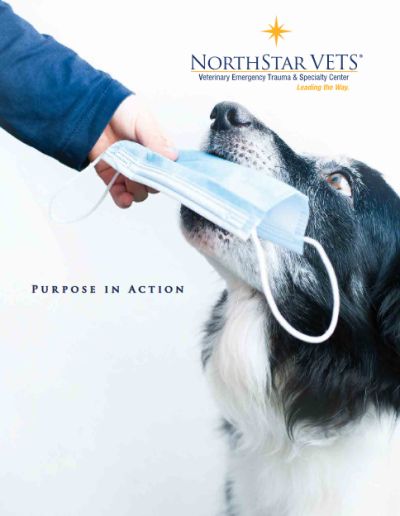
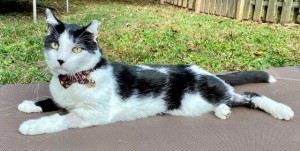
 Originally a native of New York City, Dr. Barber received her DVM degree from The Ohio State University College of Veterinary Medicine in 1992. She went on to pursue a rotating internship in small animal medicine and surgery followed by a residency in medical oncology at the University of Pennsylvania. She then served as a staff oncologist at Penn until 2001. Dr. Barber joined the faculty of Cummings School of Veterinary Medicine at Tufts University in 2002 and became section head of oncology in 2003. During her 18 years at Tufts, she treated a variety of different types of animals for cancer, conducted clinical trials of new therapies, published many scientific articles, and trained veterinary students and residents. She is a recipient of the Artemis Award for Clinical Excellence and the Zoetis Award for Veterinary Research Excellence. She remains an adjunct professor at Tufts. Dr. Barber joined NorthStar VETS in 2020. Her interests are both innovative therapies for the treatment of cancer in companion animals and palliative care, but her primary focus is preserving and enhancing quality of life in pets with cancer.
Originally a native of New York City, Dr. Barber received her DVM degree from The Ohio State University College of Veterinary Medicine in 1992. She went on to pursue a rotating internship in small animal medicine and surgery followed by a residency in medical oncology at the University of Pennsylvania. She then served as a staff oncologist at Penn until 2001. Dr. Barber joined the faculty of Cummings School of Veterinary Medicine at Tufts University in 2002 and became section head of oncology in 2003. During her 18 years at Tufts, she treated a variety of different types of animals for cancer, conducted clinical trials of new therapies, published many scientific articles, and trained veterinary students and residents. She is a recipient of the Artemis Award for Clinical Excellence and the Zoetis Award for Veterinary Research Excellence. She remains an adjunct professor at Tufts. Dr. Barber joined NorthStar VETS in 2020. Her interests are both innovative therapies for the treatment of cancer in companion animals and palliative care, but her primary focus is preserving and enhancing quality of life in pets with cancer.